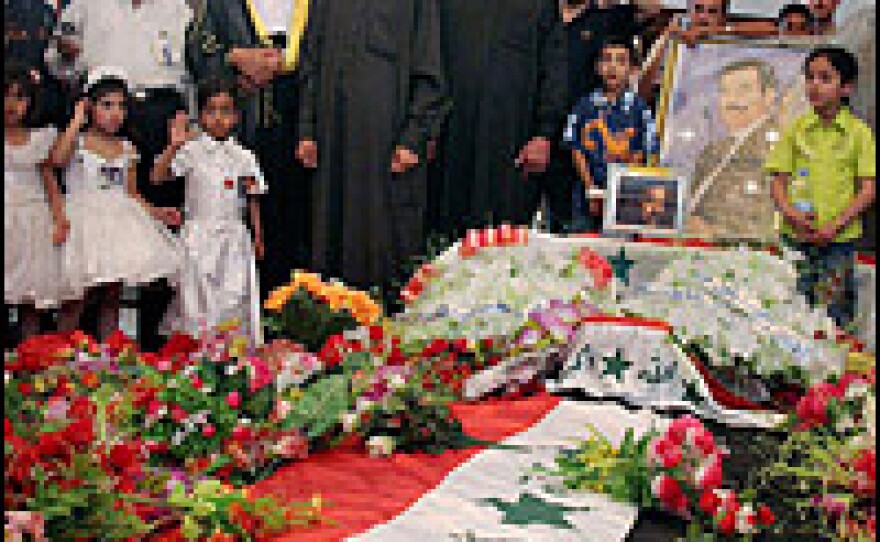
When Saddam Hussein ruled Iraq, his tribe was the most powerful in the country. But after the U.S.-led invasion in 2003, the tribe's fortunes took a decided turn for the worse. Its assets were frozen, and its name was vilified by those who hated the dictator.
Saddam's tribe, the Albu Nasr, is based a short drive from the northern city of Tikrit in the village of Ouja. It is a dusty and Spartan place with wide roads surrounded by farmland.
Cresting a small hill is a large audience hall where the tribe conducts its business. A fireplace dominates one end of the long room near where tribal leader Sheikh Hassan al-Neda holds court.
Al-Neda says the tribe's misfortunes began in 2003 when the American occupation authority under Paul Bremer issued a decree freezing the assets of many members of his tribe.
"They came and registered every single name in the village — even the children," al-Neda says. "And five years on, we are still suffering. So now if I want to put some money in the bank, I cannot draw it back out. I can't sell my private car. I can't sell my house or land. We have no jobs. We have no income."
'Walking Into A Dark Tunnel'
Al-Neda says many members of his tribe — some 2,800 people — have been affected. Everyone in Ouja, from the poorest farmer to the tribal elders, is under sanctions. Al-Neda says it's a form of collective punishment and that no one from the Shiite-led government in Baghdad is helping them to resolve the issue.
"No one cares about our case, and we received no response from all the people we contacted," he says. "We are walking into a dark tunnel, and there is no light at the end of it."
NPR contacted officials at Iraq's finance ministry, which is in control of the frozen assets. They confirmed that some people had their assets frozen because they were high-level Baathists or had been members of Saddam's inner circle, but they denied that the entire tribe is being targeted.
Al-Neda says the asset freeze was originally ordered to stop the members of the tribe from funding the insurgency.
"They believed that the people of this village would sell everything and give it to the resistance," he says. "In fact, it's a very silly excuse because if we gathered together all of our funds and properties here, it would not be enough to fund the resistance for a month."
Village Of Gold And Silver Bricks?
Now, al-Neda says, the freeze is being enforced out of spite. And al-Neda has conflicting feelings about Saddam. Al-Neda's family is the guardian of the former leader's grave, which is located in Ouja, but al-Neda says Saddam also oppressed them.
"People in the past thought that this village was built out of golden and silver bricks and that all the food and the prices were subsidized," he says. "I swear we were never given any rewards."
Many members of Saddam's tribe were given important posts in the armed forces and in government ministries, and the sheik's son recounted how he was once given a car by the former Iraqi leader. The mere fact that they belonged to Saddam's tribe made them feared and respected.
These days, al-Neda says, his tribe's name inspires hatred, discrimination and worse.
"I'm actually terrified, because both of the former leaders of our tribe were killed in a period of two years," he says. "How long I can survive? A year, or six months? I don't know."
Al-Neda's son points to the simple marble graves of Saddam's sons, Uday and Qusay. Their father's tomb is much more elaborate. It sits in the middle of a white marble room surrounded by a random assortment of memorabilia: a desk he once used, pictures and framed copies of his speeches, a photo of the shoes he was wearing on the day he was hanged.
They refer to him here as the "father of martyrs."
On this day, a few people have wandered in to take pictures of the grave, which is covered in white satin and festooned with plastic flowers.
One visitor, Abu Suifian, lives in Ouja and says he and many other residents have been affected by their tribal links to Saddam.
"I am poor and I am jobless," Suifian says. "The only way I can survive and support my family is to sell the one piece of land I own, but I can't."
Still, Sufian says he doesn't blame his predicament on Saddam. He walks through the shrine, accompanied by his two children.
"Saddam never did anything bad to the Iraqis," Sufian says. "None of this is his fault."
Copyright 2022 NPR. To see more, visit https://www.npr.org. 9(MDAzMjM2NDYzMDEyMzc1Njk5NjAxNzY3OQ001))






